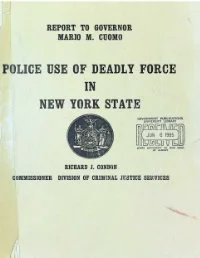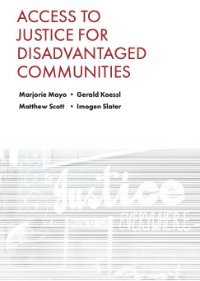Accountability: How Qualified Immunity Shields a Wide Range of Government Abuses, Arbitrarily Thwarts Civil Rights, and Fails to Fulfill Its Promises
By Jason Tiezzi, Robert McNamara, and Elyse Smith Pohl
Qualified immunity is perhaps America’s most controversial legal doctrine, erupting into the national consciousness during debate over police misconduct in 2020. Created by the U.S. Supreme Court four decades ago, the doctrine protects government officials from being sued for violating constitutional rights—unless victims can show those rights are “clearly established.” In practice, this often means pinpointing a published opinion from the Supreme Court or the federal appellate court in their jurisdiction finding the same conduct in the same circumstances unconstitutional.
The Supreme Court intends for qualified immunity to give government officials leeway to make reasonable mistakes—especially in tense or dangerous situations requiring quick thinking—without facing lengthy litigation, onerous discovery, or financial ruin. By insisting rights be clearly established to receive protection, the Court aims to put officials on notice of conduct to avoid before they face such consequences. Critics counter, however, that qualified immunity sets too high a bar for victims of abuse to seek justice and winds up protecting officials who intentionally, maliciously, or unreasonably violate the Constitution. They also argue the doctrine does not work as the Court intends.
This study adds new evidence to the record using the largest ever collection of federal appellate cases, covering the 11-year period from 2010 through 2020. It is the first to use cutting-edge automated techniques to parse thousands of federal circuit court opinions and answer key questions about cases where government defendants claim qualified immunity—what kinds of officials and conduct it protects, its impact on civil rights cases, and whether the doctrine is achieving its aims.
Key findings include:
In the federal circuit courts, qualified immunity appeals have become more common.
From 2010 through 2020, at least 5,526 cases before federal circuit courts raised qualified immunity on appeal, an average of about 500 cases a year.
And from the first half of our study period to the second, the annual average of qualified immunity appeals grew by 20%, even as civil appeals of all types fell.
Contrary to popular belief, qualified immunity is not just about police accused of excessive force. It shields a wide array of government officials and conduct.
While police were the most common defendants, fully half of appeals featured other types of government officials, either alongside or instead of police. Prison officials made up the next largest share, but in more than one in five of all appeals, or 21%, defendants were neither police
nor prison officials. These other officials included mayors and city managers, university and school officials, prosecutors and judges, and child protective services workers.
Excessive force was alleged in just 27% of appeals, followed by false arrest at 25%; some alleged both. But the third largest category, alleged in 18% of appeals, encompassed violations of First Amendment rights, including speech, association, and religious liberty.
Altogether, only 23% of appeals fit the popular conception of police accused of excessive force. In most First Amendment appeals, plaintiffs alleged government officials engaged in premeditated retaliation for protected speech or activity.
In a representative sample of 125 First Amendment appeals, 59% involved plaintiffs alleging premeditated abuse by government officials in retaliation for protected First Amendment activity. In nearly half of such cases, government workers alleged retaliation from their superiors, while in nearly a third, private citizens claimed they were targeted for retaliation by government officials.
Qualified immunity favors government defendants and makes it harder for plaintiffs to win—regardless of the merits of their claims.
In all, 59% of qualified immunity appeals were resolved solely in favor of government defendants, while 24% were resolved solely in favor of plaintiffs.
Qualified immunity disadvantages plaintiffs for arbitrary reasons, such as their circuit’s population or publication rate. These vary widely and influence the volume of clearly established law in a circuit—and therefore, the volume and variety of prior cases that plaintiffs can rely on to vindicate their rights.
Qualified immunity rulings often lack precision and clarity, again making it hard for plaintiffs to pinpoint the clearly established law required to win. In common with other legal experts, ours often could not untangle courts’ reasons for granting qualified immunity—if reasons were even offered.
When denied qualified immunity, government defendants have the right to file special immediate appeals—a right unavailable to plaintiffs. And they can do this multiple times in the same lawsuit. Such “interlocutory appeals” accounted for 96% of all defendant appeals.
These special appeals risk wearing down worthy plaintiffs with extended litigation. Their prevalence likely helps explain why the median duration of a qualified immunity lawsuit was three years and two months, 23% longer than the typical federal civil suit up on appeal.
Our findings provide more evidence that qualified immunity is a poor fit for achieving its goals.
Qualified immunity confuses instead of clarifies the rules government workers must follow to avoid burdensome litigation. If legal experts struggle to make sense of qualified immunity, the average government official—let alone one facing a life-or-death situation—cannot be expected to do so.
Qualified immunity fails to protect officials from the burdens of litigation, most notably potentially intrusive discovery. Nearly 70% of appeals came at the summary judgment stage of litigation, when courts typically have already allowed discovery.
Qualified immunity clogs up the courts with extra, often lengthy, appeals—some 2,000 interlocutory appeals that would not have existed without the special appeal rights given to government defendants.
These results suggest qualified immunity shields a much wider array of government officials and conduct than commonly thought. They also add to a growing body of research finding qualified immunity protects officials too much and our rights too little, all while failing to achieve its goals. This strengthens the argument for the Supreme Court or Congress to temper or—better yet—abolish the doctrine.
Whether through outright abolition or significant reform, courts and lawmakers can and should act to eliminate the unbounded impunity allowed by qualified immunity.
Arlington, VA: Institute for Justice, 2024. 6op.

















